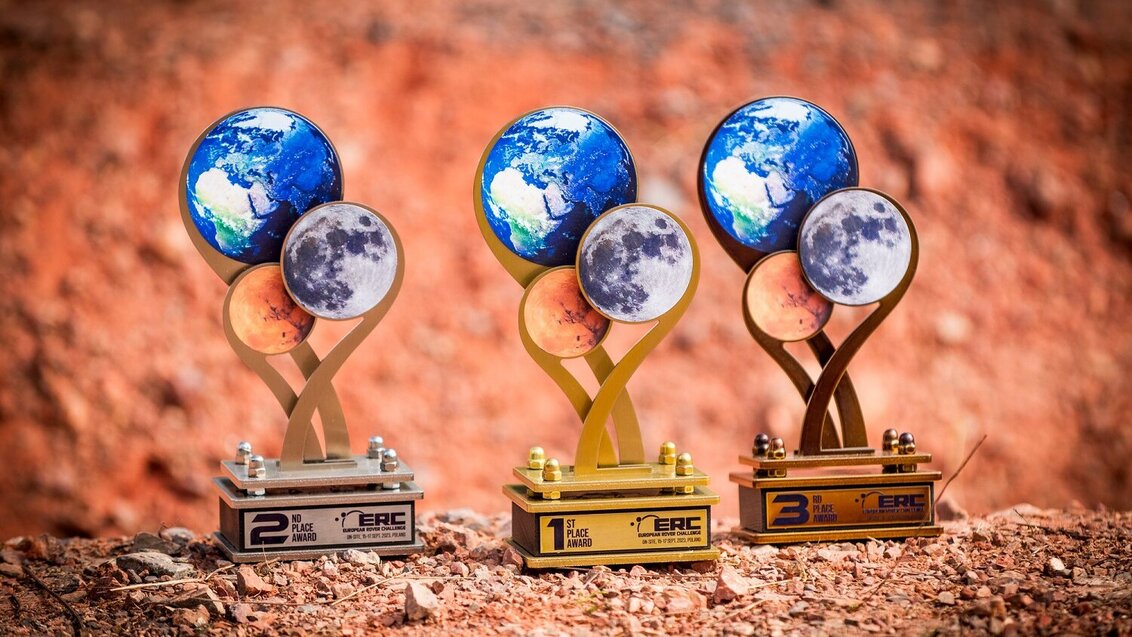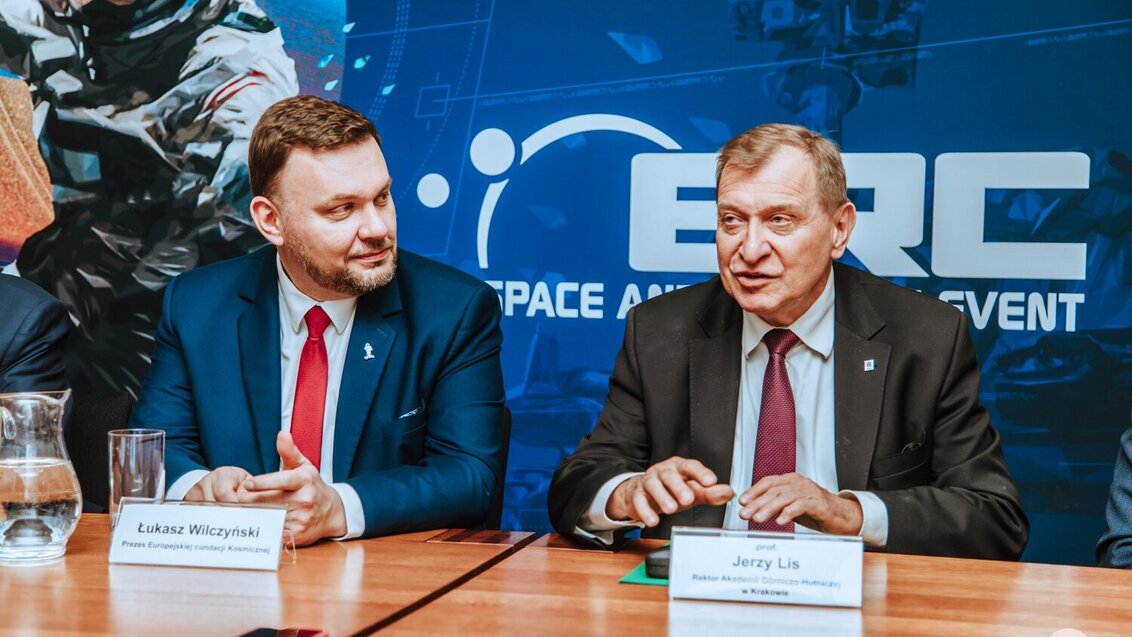
Photo source: facebook.com/europeanroverchallenge/
The 10th jubilee edition of the European Rover Challenge will take place in Krakow on 6–8 September 2024. To host the ERC is the AGH University of Krakow. The organiser and originator of the competition is the European Space Foundation.
What is the ERC?
The ERC is a prestigious, international space and robotics event taking place in Poland for 10 years. It is a connection of an acclaimed Martian rover competition with the participation of the best academic teams in the world, an industry conference, and a zone of science and technology shows.
The tasks in the ERC faithfully reproduce the challenges faced by rovers currently operating on Mars and the Moon. The European Rover Challenge, also called "International Space Robotics Competition," gives student teams a chance to showcase their skills and creativity not only in front of a wide audience, but also in front of representatives of global space agencies (such as NASA, ESA, EUSPA, DLR, CNES, or POLSA) and industry experts who, at the invitation of the organisers, visit the event and share their knowledge and experience.
Since 2024, nine editions of the event have already been held, with more than one million people attending the event on-site and online. The ERC is visited by tens of thousands of space and technology enthusiasts, space professionals, and families with children. Thanks to the online broadcast, the event is also followed by audiences abroad.
Creating Mars on Earth
The ERC takes place on a special Martial track. It is a unique installation, designed by planetary geologists from the Polish Academy of Sciences, inspired by a selected piece of the Red Planet. Active volcanos, impact craters, lava channels, traces of water activity are just some of the elements that may be found there. Marsyard attracts the attention of scientists from all over the world owing to the faithful reproduction of Martian geological processes.
“Our Marsyard showcases processes that shape the landscape of the Red Planet: we create a complex geological puzzle consisting of numerous impact craters, dunes, dry river valleys, and various volcanic features that very few people can solve. To make things even more absurdly complicated, our Marsyard is different each year and represents a distinct region of the Red Planet,” clarifies Dr Anna Łosiak, ERC Chief Science Officer, Institute of Geological Sciences of the Polish Academy of Sciences.
How does the competition work?
The main task in the ERC is to design and create a Martian rover which will perform the competition tasks inspired by real-life NASA and ESA space missions in the most precise way. Students of the best technical universities in the world form teams in which they design unique Martian rover constructions. After a few months of hard work, their documentation is evaluated by renown specialists from the space sector companies and organisations. It is then that the finalists may present the capacity of their robots on a special Martian track (so-called Marsyard) in a few tasks based on missions of space agencies, like NASA and the ESA, that actually took place. ERC 2024 tasks teaser
“Our main goal is to create interesting and demanding tasks for the teams but also to ensure the application of the standard R&D practices along the way. We are convinced that due to such an approach the participants will be ready to face professional challenges in the space field right after graduating,” explains Marcin Wygachiewicz, ERC Head of Jury, PSPA (Polish Space Professionals Association).
The ERC jury will consist of experts from the space sector from organisations such as: Polish Space Professionals Association, Polish Space Industry Association, Polish Academy of Sciences, Mars Society Polska, and international commercial entities.
It is worth mentioning that in the last two editions the first place belonged to AGH Space Systems and their rover, Kalman.
ERC = COMPETITION + EXHIBITORS + CONFERENCE
The ERC is much more than just a competition! During the three-day event, the visitors are welcomed by the Inspiration Zone, which annually brings together representatives of commercial space companies, the academic and scientific community (including: scientific circles, student associations, research units), STEM foundations, but also start-ups. The Inspiration Zone is the perfect place for technology news seekers and astronomy enthusiasts of all ages and levels of expertise. This vibrant space abounds with innovations and attractions prepared by space exhibitors.
“It's a place where you can learn more about STEM/STEAM topics, share ideas and experiences, get inspired by conversations with enthusiasts and space professionals, awaken your passion for exploring the world, go beyond the usual thinking and create new projects,” claims Dr Anna Karahan, ERC Conference & STEAM Coordinator.
The ERC also features an industry conference where leading space sector experts, astronauts, and scientists discuss space and its impact on our past, present, and future. These three days are divided in terms of leading themes, maintaining a high level of interdisciplinarity and a broad context of speeches and lectures. The event's agenda includes debates on the future of human settlement on the Moon and Mars, projects and missions on the Silver Globe developed by NASA and the ESA in the coming years, as well as important topics related to sustainability and commercialisation.
What guests can you meet during the ERC?
Among the special guests at the previous editions were: Steve Jurczyk – former head of NASA, Robert Cabana – former associate administrator of NASA, Robert Zubrin – founder of The Mars Society, Harrison Schmitt – NASA astronaut and member of the legendary Apollo 17 mission, and Tim Peake – astronaut of the European Space Agency, who during his stay at the International Space Station run the London Marathon, but also Sławosz Uznański, Polish ESA project astronaut.
The ERC is regularly attended by experts from the institutions including: NASA, European Space Agency (ESA), European Union Agency for the Space Programme (EUSPA), German Aerospace Center (DLR), International Space University (ISU), and International Astronautical Federation (IAF), but also space sector entities such as: Thales Alenia Space, Airbus, GMV, SENER, CBK PAN, iSpace, and RedWire.
10th edition at the AGH University
This year's anniversary edition of the International Space Robotics Competition will be held on the AGH University campus in Krakow.
“We cannot wait until September to host the special International Martian Rover Challenge. We are truly proud of the fact that our infrastructure at the Space Technology Centre, our scientific and research facilities allow for hosting such a grand event. For the people that live here in Krakow, but also in the entire Małopolska region, it will be one-of-a-kind opportunity to see such spectacular constructions as Martian rovers up close. We kindly invite you to the event. I am certain that it will make an amazing opportunity for the youngest generation to catch the space exploration bug,” claims the AGH University Rector, Professor Jerzy Lis.
On European Space Foundation
The main organiser of the ERC is the European Space Foundation, an award-winning organisation that supports initiatives prioritising the future of a new generation based on STEAM sciences and space technologies. In addition to the European Rover Challenge, the Foundation's team is involved in conducting workshops and educational campaigns in Polish schools, such as Mars Colony Hackathon. In 2023, the Foundation was the only European entity to be shortlisted for the prestigious Global E-STEM Award from Pratt & Whitney and the North American Association for Environmental Education (NAAEE).
More information on the International Martian Rover Challenge
The press conference regarding the 10th edition of the ERC took place on February 13 at the AGH University. Photo by Patrycja Chęcińska, KSAF Agency

 Pre-election meeting with a candidate for the position of rector
Pre-election meeting with a candidate for the position of rector  Agreement on cooperation with OPAL-RT
Agreement on cooperation with OPAL-RT  Krakow DIANA Accelerator consortium members with an agreement
Krakow DIANA Accelerator consortium members with an agreement  Meeting with the Consul General of Germany
Meeting with the Consul General of Germany  More Academic Sports Championships finals with medals for our students
More Academic Sports Championships finals with medals for our students  Professor Jerzy Lis re-elected as AGH University Rector
Professor Jerzy Lis re-elected as AGH University Rector  Launch of AGH University Student Construction Centre
Launch of AGH University Student Construction Centre  Bronze for our swimmers at Academic Championships
Bronze for our swimmers at Academic Championships